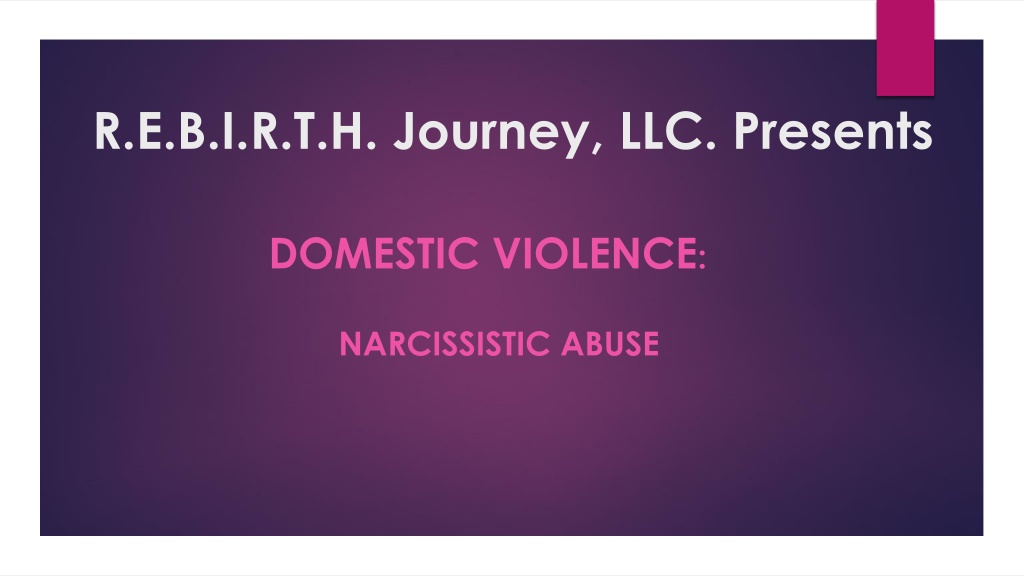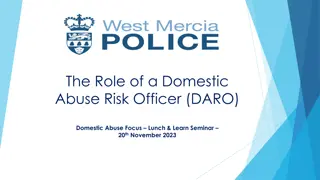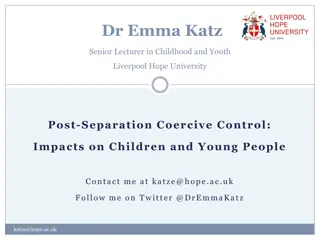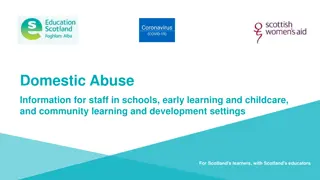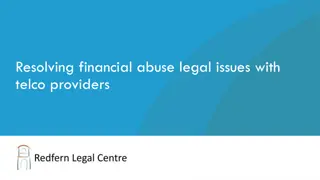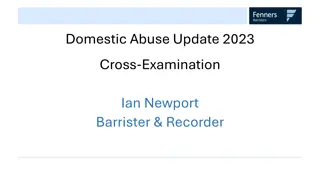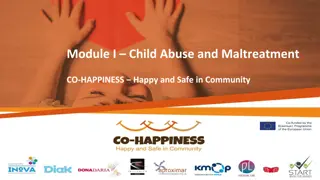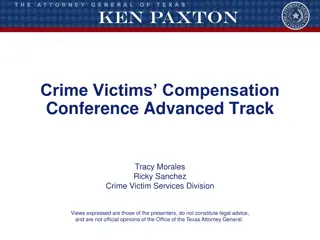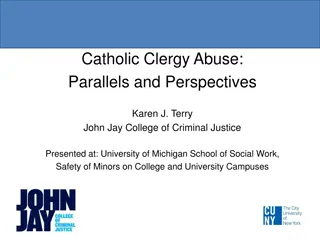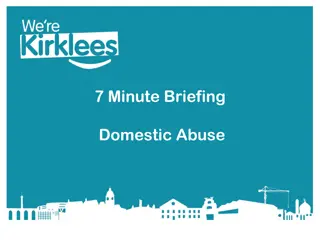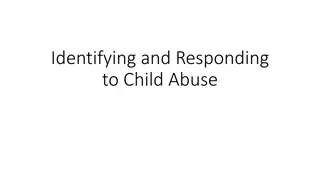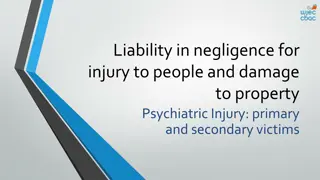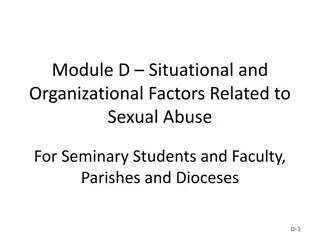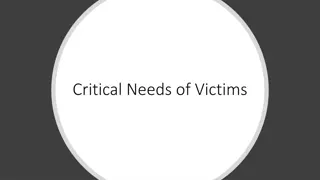Understanding Narcissistic Abuse: The Insidious Manipulation of Victims
Narcissistic abuse is a form of severe psychological and emotional manipulation that targets a victim's spirit and identity. The abuser employs tactics such as lying, manipulation, denial of reality, and control. This abuse is often invisible and devastating, characterized by a lack of empathy and a need for admiration on the part of the narcissistic individual. Understanding the dynamics of narcissistic abuse, recognizing the traits of a narcissist versus an empath, and familiarizing oneself with common terms such as love bombing, hoovering, gaslighting, and deflection is crucial for identifying and breaking free from these toxic relationships.
Download Presentation

Please find below an Image/Link to download the presentation.
The content on the website is provided AS IS for your information and personal use only. It may not be sold, licensed, or shared on other websites without obtaining consent from the author. Download presentation by click this link. If you encounter any issues during the download, it is possible that the publisher has removed the file from their server.
E N D
Presentation Transcript
R.E.B.I.R.T.H. Journey, LLC. Presents DOMESTIC VIOLENCE: NARCISSISTIC ABUSE
What is Narcissistic Abuse? Form of severe psychological and emotional abuse. It is invisible; Assault on the spirit, identify psyche of the victim; Abuse by lying, manipulating, denying reality, controlling victim. Narcissistic Personality Disorder (NPD)- Mental disorder in which people have an inflated sense of their own importance, a deep need for admiration and lack of empathy for other.
Narcissist vs. Empath Narcissist-Individual who has an excessive sense of self- importance and lack of empathy for others. In an unhealthy relationship, desires the need to dominate and control others who can validate their existence. 1-6% of the population suffer from narcissistic personality disorder; 1 in 25 ppl are sociopaths (equal to antisocial personality disorder). Cause is unknown but early life experiences such as insensitive parenting, thought to play a role in the development of the disorder. Empath- Individual with heightened sensitivity to feelings and emotions. They can often feel what others are feeling. In an unhealthy relationship, often becomes isolated from friends and family, constantly walking on eggshells , and always in a state of confusion. About 15-20% of the population are identified highly sensitive and another 2-3% are identified as empaths. Factors that increase your chances of being an empath: temperament, genetics, trauma, supportive parenting.
Common Terms Love Bombing- The period during which the victim is targeted and worked into a relationship with abuser quickly and to erase bad behavior. The abuser studies/seduces/charm you to have you remove any walls you may have up to protect feelings so that they can get into personal/private space quickly. Will do things such as engage in excessive and constant calls/texts/emails throughout the day to make you feel wanted and important but is really to gage control and your willingness to allow them to overstep boundaries. Hoovering- The period when the abuser tries to suck victim back into relationship after the victim has shown signs of concern/displeasure and wants to break away. The follow behaviors maybe present during this time: Extravagant gifts/flowers Sending random declarations of undying love Uses friends/family to get to you Promises of changed behavior Threats of suicide Baits you with drama to get a response/faking the need for help
Common Terms Deflection/Projection/Scapegoating- The abuser uses manipulation and triangulation to change the subject or accuse you of things that they have actually done, as if to take the pressure off of themselves. Abuser may do things such as go into a rage just to avoid taking any responsibility. Gaslighting- The abuser attempts to distort the victims reality through ignoring evidence, denying manipulative behaviors, diverting conversation, and ultimately brainwashing the victim through manipulation. The victim will suffer from some of the following things: Constantly questioning themselves Being very sensitive Easily getting confused Struggling to make decisions Constantly apologizing Thinking they do everything wrong Thinking they aren t good enough Feeling like they are making bad choices Isolating themselves Being unhappy for no reason Creating excuses for abuser Losing confidence
Common Terms B.A.I.T. Once baited and you react- Narc will use your reaction as proof the problem lies with you Bring it up- embarrassing or traumatic issues from past Antagonize- provoke you using emotional/verbal or physical abuse to anger you Invent- false story about you Triangulate- bring opinions of others Reactive Abuse- Toxic person intentionally abuses someone and victim responds with anger or another normal reaction. Then, toxic abuser accuses victim of being abusive.
Differences between Narcissistic Abuse & Emotional Abuse Narcissistic Abuse: Abuse of Mental Process Emotional Abuse: Abuse of Emotions Results in partner feeling anxiety, chronic depression, Punish to show who is the boss Trains victims on how to behave Vindictiveness/Toxic amnesia Triangulation Likes to gain sympathy Impossible arguments-blame shifting Results in partner feel irrational and over emotional Put blame on someone else, doesn t take accountability Having poor self-esteem and PTSD Silent Treatment Neglect Isolation Devaluing Name Calling Exhibits dominating behaviors- such as bullying, mind games, humiliation, minimizing, controlling, intimidation . Often product of threats made/carried out and emotional black mail
Preventing Escalation With A Narcissist Do Don t Set boundaries, Contact them or Respond to them, Isolate yourself from them, Engage in arguments or give them any extra attention, Accept personal responsibilities for your circumstances to gain the power to change it, Try to reason with them, Be co-dependent, Say no without guilt, Try to control them, Pay attention to how you talk to yourself, Make assumptions/ snap judgements, Keep secrets, Educate yourself, Take responsibility or blame. Practice self care.
Stages of Grief: Normal vs Psychopathic Relationship Stages of Grief: Process in a Normal Relationship Stages of Grief: Process in a Psychopathic Relationship 1. Denial 1. Total Devastation 2. Anger 2. Denial VS. 3. Bargaining 3. Education/Self doubt 4. Depression 4. Understanding the Psychopath 5. Acceptance 5. Rage 6. Healing 6. Depression 7. Healing
Stages Of Grief For Victims Who Escape Psychopathic Relationships Stage 1- Total Devastation: Shock and disbelief, Feeling empty, difficulty performing trivial tasks, Psychologically vulnerable. Stage 2- Denial: See abuser living happy and feeling like you have to prove you are also happy so they can want you back, Impulsive, harboring delusional thoughts, trying to duplicate certain dynamics with a new person. Stage 3- Education & Self Doubt Come across terms of psychopathy, narcissism, sociopathy and read up on it identifying with many of the red flags, Experience self-doubt and self-blame. Stage 4- Understanding the Psychopath Important in recovery, Can put the behaviors in perspective and see why they did what they did.
Stages Of Grief For Victims Who Escape Psychopathic Relationships Stage 5- Rage and Depression Yo-yo between the two; there will be good days vs. bad days, Obsessive racing thoughts and talk about it all the time to anyone willing to listen, Realize what you lost, Trust issues developed, Want to tell everyone about what abuser did. Stage 6- Healing Asking questions such as Why did it happen? , What are my weaknesses/triggers? , Thinking how to do things differently, rethinking was you were exploited or red flags you ignored. Stage 7- Self Discovery Discover strengths, re-identify previous weaknesses, Gain self-respect and confidence.
Sources Brown, Sandra L. The Damage They Do. Your Recovery Starts Here. N.p., 03 Dec. 2016 Bonchay, B (2015). A Subtle Warning sign of A Toxic Person. Free from Toxic, June 4. https://freefromtoxic.com/2015/06/04/the-early-warning-sign-of-a-toxic-person-you-never- hear-about/ Swithin, T (2013). The Narcissism Epidemic: The Red Flags. Huffington Post, 9 May. http://www.huffingtonpost.com/tina-swithin/the-narcissism-epidemic_b_3238674.html Additional Websites: World Narcissistic Abuse Awareness Day (https://wnaad.com/) Narcissist Abuse Support (https://narcissistabusesupport.com) Psychopath Free (https://psychopathfree.com/) https://drjudithorloff.com/4-reasons-why-people-become-empaths-from-trauma-to-genetics/
About The Presenter Janessa Rivera Email: the.rebirth.journey@gmail.com Website: https://riveraj5.wixsite.com/rebirthjourneyllc/bio Instagram: @rebirth_journey Facebook: The Rebirth Journey
